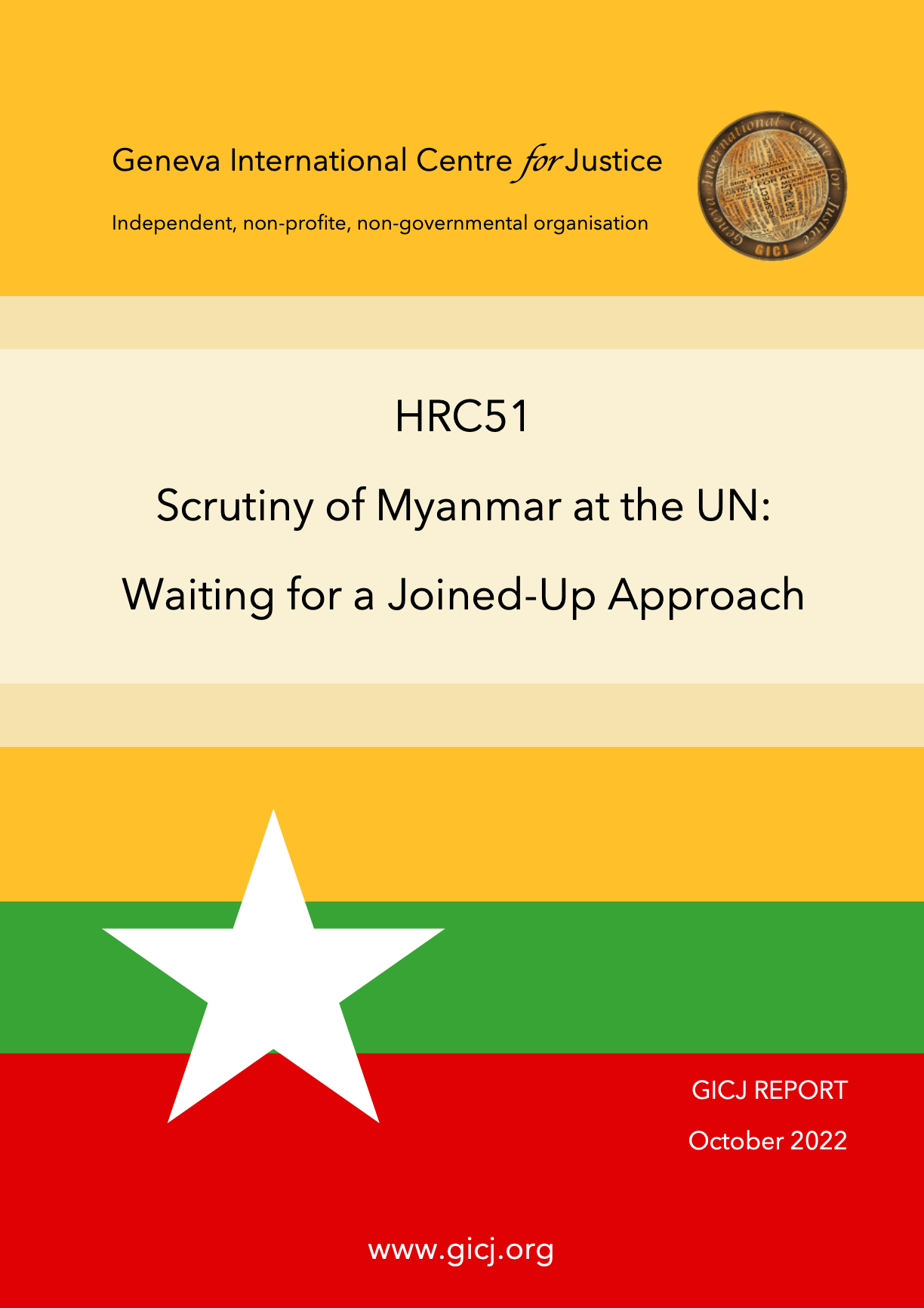By Martin Browne and Loïc Dorthe / GICJ
Since 2015, the Myanmar military has been accused of committing crimes against humanity, violating human rights, and breaking international law by using force against the Rohingya and other minorities in Myanmar.
In addition, the military led a coup to install the junta on the 1st of February 2021. Since that time, the army and the leaders that were installed have been accused of committing severe crimes against the population to suppress pro-democracy protests and prevent public dissent.
Between the 12th of September and the 7th of October 2022, the 51st session of the Human Rights Council featured three different Interactive Dialogues with various UN mechanisms scrutinising the human rights situation in Myanmar. In addition, an oral update was provided by the Acting High Commissioner for Human Rights covering similar matters. This report presents these discussions and analysis including covering:
- An Interactive Dialogue with the Head of the Independent Investigation Mechanism for Myanmar (IIMM), Mr Nicholas Koojiman, presented the 4th annual report, on efforts to collect, consolidate, preserve and analyse evidence of crimes committed in Myanmar since 2011.
- An Interactive Dialogue with the Special Rapporteur for Myanmar, Mr Tom Andrews who presented a further oral update on his work reviewing the human rights situation across the whole country.
- An Interactive Dialogue based on the OHCHR's report on the progress made and remaining challenges with regard to the recommendations of the formerly constituted Independent International Fact-Finding Mission on Myanmar (FFM).
- Finally, an oral update was provided by the Acting High Commissioner for Human Rights, Ms. Nada Al-Nashif on the most recent urgent human rights concerns.
All the reports point to a degrading human rights situation in Myanmar. This is occurring alongside the growing capacity of the IIMM to collect and analyse information on crimes committed in the country. It is also in spite of previous efforts to use accountability mechanisms to deter human rights abuses and is testimony to the failure to implement the FFM's recommendation of various targeted measures to weaken the stranglehold of the Myanmar military. Making this point forcefully, the OHCHR report notes alarm at the untrammelled power of the junta that is unchecked by the international community’s activity. It appears that too few economic sanctions have been imposed to date. As a consequence, there is still a free flow of arms and other sensitive equipment being sold to the junta, ensuring its leaders are able to exercise control over different parts of the country. The sale of arms and supplies to Myanmar clearly facilitates the commission of crimes against its people. Violations of human rights and humanitarian law continue to be perpetrated by the junta and people continue to suffer under its cruel rule. There appears to be no sign of international efforts to date having a deterrent effect on this course of criminal conduct.
The effectiveness of international mechanisms to deter rights violations, enhance diplomatic efforts and increase accountability for abuses must be analysed to identify what prevents a more beneficial outcome. The context of Myanmar undermines claims by the international community that it takes all forms of human rights abuses seriously. Reviewing the work of UN human rights mechanisms often reveals frustrations about countries not providing basic support for refugees, investigators, and an underlying aim to optimise their benefit from regional political power struggles.
In order to finally take action against the junta and improve the human rights situation of the people of Myanmar, Geneva International Centre for Justice (GICJ) strongly supports the mandate of the IIMM, as the body most capable of delivering truth-seeking and documenting abuses to the highest standards to facilitate future prosecution of serious international crimes. GICJ calls on states to take responsibility and implement targeted, coordinated, and effective sanctions to deprive the military of its financial resources. We also call for the extension of humanitarian assistance to the people of Myanmar and to refugees who have fled to neighbouring countries. Finally, GICJ reiterates that no state should recognise the junta as the legitimate government of the country, and urges the return of peace, respect for human rights, democratic institutions, and freedom in order to ensure accountability and justice for the people of Myanmar.
Click on the PDF to read the entire report!
Human Rights Council, HRC, HRC51, 51st Session, United Nations, UN, Myanmar, Junta, Rule of Law, Human Rights, Violations, Junta, Genocide, Tatmadaw, Independent Investigation mechanism for Myanmar, IIMM, Special Rapporteur for Myanmar, OHCHR Report, Fact Finding Mission, FFM, Geneva, Justice, Geneva4Justice, GICJ, Geneva International Centre for Justice





